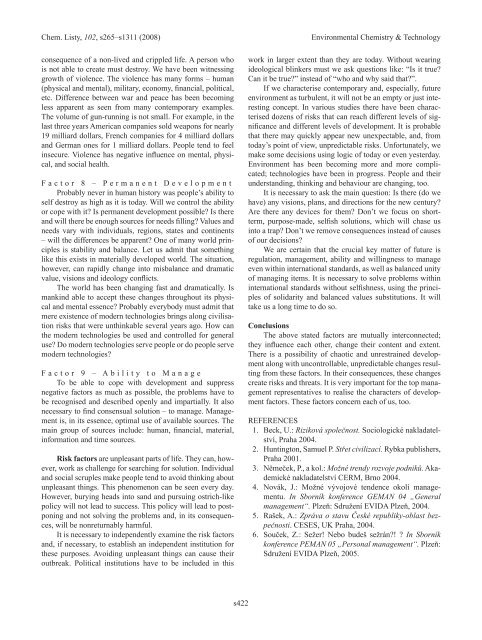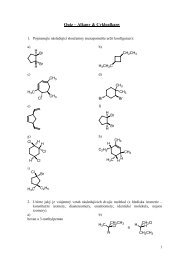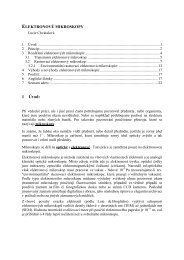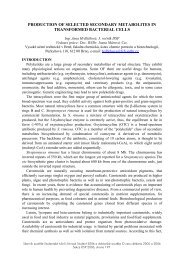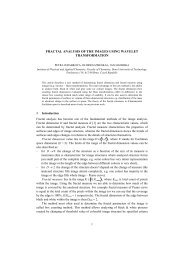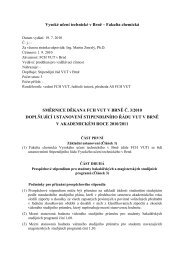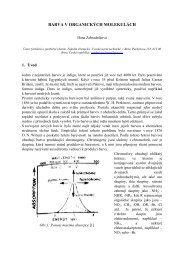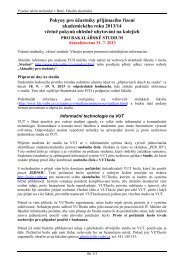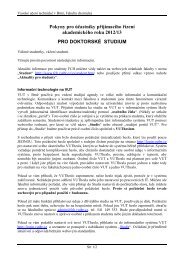2. ENVIRONMENTAL ChEMISTRy & TEChNOLOGy 2.1. Lectures
2. ENVIRONMENTAL ChEMISTRy & TEChNOLOGy 2.1. Lectures
2. ENVIRONMENTAL ChEMISTRy & TEChNOLOGy 2.1. Lectures
You also want an ePaper? Increase the reach of your titles
YUMPU automatically turns print PDFs into web optimized ePapers that Google loves.
Chem. Listy, 102, s265–s1311 (2008) Environmental Chemistry & Technology<br />
consequence of a non-lived and crippled life. A person who<br />
is not able to create must destroy. We have been witnessing<br />
growth of violence. The violence has many forms – human<br />
(physical and mental), military, economy, financial, political,<br />
etc. Difference between war and peace has been becoming<br />
less apparent as seen from many contemporary examples.<br />
The volume of gun-running is not small. For example, in the<br />
last three years American companies sold weapons for nearly<br />
19 milliard dollars, French companies for 4 milliard dollars<br />
and German ones for 1 milliard dollars. People tend to feel<br />
insecure. Violence has negative influence on mental, physical,<br />
and social health.<br />
F a c t o r 8 – P e r m a n e n t D e v e l o p m e n t<br />
Probably never in human history was people’s ability to<br />
self destroy as high as it is today. Will we control the ability<br />
or cope with it? Is permanent development possible? Is there<br />
and will there be enough sources for needs filling? Values and<br />
needs vary with individuals, regions, states and continents<br />
– will the differences be apparent? One of many world principles<br />
is stability and balance. Let us admit that something<br />
like this exists in materially developed world. The situation,<br />
however, can rapidly change into misbalance and dramatic<br />
value, visions and ideology conflicts.<br />
The world has been changing fast and dramatically. Is<br />
mankind able to accept these changes throughout its physical<br />
and mental essence? Probably everybody must admit that<br />
mere existence of modern technologies brings along civilisation<br />
risks that were unthinkable several years ago. How can<br />
the modern technologies be used and controlled for general<br />
use? Do modern technologies serve people or do people serve<br />
modern technologies?<br />
F a c t o r 9 – A b i l i t y t o M a n a g e<br />
To be able to cope with development and suppress<br />
negative factors as much as possible, the problems have to<br />
be recognised and described openly and impartially. It also<br />
necessary to find consensual solution – to manage. Management<br />
is, in its essence, optimal use of available sources. The<br />
main group of sources include: human, financial, material,<br />
information and time sources.<br />
Risk factors are unpleasant parts of life. They can, however,<br />
work as challenge for searching for solution. Individual<br />
and social scruples make people tend to avoid thinking about<br />
unpleasant things. This phenomenon can be seen every day.<br />
However, burying heads into sand and pursuing ostrich-like<br />
policy will not lead to success. This policy will lead to postponing<br />
and not solving the problems and, in its consequences,<br />
will be nonreturnably harmful.<br />
It is necessary to independently examine the risk factors<br />
and, if necessary, to establish an independent institution for<br />
these purposes. Avoiding unpleasant things can cause their<br />
outbreak. Political institutions have to be included in this<br />
s422<br />
work in larger extent than they are today. Without wearing<br />
ideological blinkers must we ask questions like: “Is it true?<br />
Can it be true?” instead of “who and why said that?”.<br />
If we characterise contemporary and, especially, future<br />
environment as turbulent, it will not be an empty or just interesting<br />
concept. In various studies there have been characterised<br />
dozens of risks that can reach different levels of significance<br />
and different levels of development. It is probable<br />
that there may quickly appear new unexpectable, and, from<br />
today’s point of view, unpredictable risks. Unfortunately, we<br />
make some decisions using logic of today or even yesterday.<br />
Environment has been becoming more and more complicated;<br />
technologies have been in progress. People and their<br />
understanding, thinking and behaviour are changing, too.<br />
It is necessary to ask the main question: Is there (do we<br />
have) any visions, plans, and directions for the new century?<br />
Are there any devices for them? Don’t we focus on shortterm,<br />
purpose-made, selfish solutions, which will chase us<br />
into a trap? Don’t we remove consequences instead of causes<br />
of our decisions?<br />
We are certain that the crucial key matter of future is<br />
regulation, management, ability and willingness to manage<br />
even within international standards, as well as balanced unity<br />
of managing items. It is necessary to solve problems within<br />
international standards without selfishness, using the principles<br />
of solidarity and balanced values substitutions. It will<br />
take us a long time to do so.<br />
Conclusions<br />
The above stated factors are mutually interconnected;<br />
they influence each other, change their content and extent.<br />
There is a possibility of chaotic and unrestrained development<br />
along with uncontrollable, unpredictable changes resulting<br />
from these factors. In their consequences, these changes<br />
create risks and threats. It is very important for the top management<br />
representatives to realise the characters of development<br />
factors. These factors concern each of us, too.<br />
REFEREnCES<br />
1. Beck, U.: Riziková společnost. Sociologické nakladatelství,<br />
Praha 2004.<br />
<strong>2.</strong> Huntington, Samuel P. Střet civilizací. Rybka publishers,<br />
Praha 2001.<br />
3. němeček, P., a kol.: Možné trendy rozvoje podniků. Akademické<br />
nakladatelství CERM, Brno 2004.<br />
4. novák, J.: Možné vývojové tendence okolí managementu.<br />
In Sborník konference GEMAN 04 „General<br />
management“. Plzeň: Sdružení EVIDA Plzeň, 2004.<br />
5. Rašek, A.: Zpráva o stavu České republiky-oblast bezpečnosti.<br />
CESES, UK Praha, 2004.<br />
6. Souček, Z.: Sežer! nebo budeš sežrán?! ? In Sborník<br />
konference PEMAN 05 „Personal management“. Plzeň:<br />
Sdružení EVIDA Plzeň, 2005.


